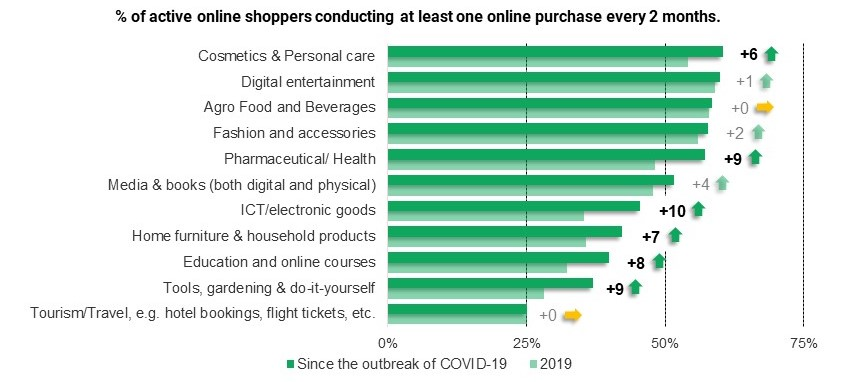This article is written by Varun Raj Wahane, currently pursuing B.A. LL.B. (Hons.) from Bharati Vidyapeeth New Law College, Pune. This article describes the problems of small businesses in COVID-19 lockdown and how digitalization has become a threat to high street shops in the time of the pandemic.
Table of Contents
Introduction
The world faces an epiphany of the Covid- 19 pandemic since the start of the year 2020, many jobs and businesses have been affected because of the crisis. The world economies have faced a large amount of fall in trade, products that have international markets have lost the value in the markets. The most convenient and affordable market were the high- street shops which were most affected in the pandemic. High street shops come under the primary markets in many countries, it is an unorganized sector that is the primary source of income to many businesses, sellers, and purchase for sellers.
As the pandemic hit the world, curfew and lockdown have become a norm of regular daily life, streets blank, shops closed, empty footpaths, and empty markets have become a normal site of many regions in the world. What has become devastating is the shift to online shopping, consumers and sellers have shifted to e-commerce and digital markets in the time of the pandemic.
These all factors have created a threat to high-street shops in the pandemic, this article will emphasize the growing challenges to the world in the pandemic, how digitalization has changed the shopping in the pandemic that can affect high street shops. The article will also describe the alternative determinants to shop owners in a pandemic and how this situation of a pandemic can be curbed for the high street shops. In conclusion, the article describes how there is hope for high street shops even in the COVID- 19 lockdown.
The pandemic’20 and the growing changes in the world
Global recession
The pandemic has affected world economies devastatingly, the global economic prospects report of the World Bank in June 2020 describes the long-term impact of the recession in world economies. The report directs 5.2% contraction in global GDP 2020. This has been the deepest recession in the decades since the 1870 plague.
Unemployment
The outcome of the growing global recession is the unemployment of skilled labor. The private companies have fired many employees because of the low-income generation in the pandemic, which has been caused by fewer opportunities for companies in the market. The government jobs have less security compared to the old employees; however, the workload has been increasing in the pandemic. This condition led to more people resigning from jobs unconditionally.
Effects of work from home culture
The pandemic has forced businesses to opt for online services for continuing business as usual. online work has reduced quality work from employees that have affected company income.
Mental health
The work from home culture has reduced the positive environment from work and created a sense of loneliness, reducing the sense of camaraderie and company culture. A global study suggests that overall 40% of people have said that their mental health has been declined since the outbreak of COVID-19.
Education
The academic curriculum of educational institutions has been disturbed because of the risk of infecting the virus of COVID-19, schools and colleges have been contagious with the virus. Therefore, institutions have shifted two online lectures on zoom apps. However, the examination has been deductive and extremely poor in analyzing students’ marks or approach to studies. The major problem of online studying has been poor Internet access. The pandemic has degraded education for students which will have long-term effects in coming years. There are currently more than 1.2 billion children in 186 countries affected by school closures due to the pandemic, according to the World Economic Forum the pandemic has changed education for decades.
Travel and tourism industry
The constant lockdowns and curfews have stopped travel and transport, the tourism industry that includes hotels, restaurants, high-street shops, handmade crafts, tourist guides, and locals have faced a total shutdown in the pandemic. The global travel industry has been affected by restrictions on travel by different states. According to the UNWTO analysis of the impact of COVID-19 on tourism, export revenues from tourism could fall by 910 billion to 1.2 trillion in 2020, this is important because tourism supports one in 10 jobs and provides the livelihood for many.

Pandemic’20 and digitalization: a threat to the high-street shops
During the covid-19 pandemic, there has been a large-scale shift to e-commerce websites, online orders, and online delivery services, to maintain social distancing and avoid public gathering online shopping have become a safe option for the consumers. However, social distancing has become a major disadvantage to the high street shops and regular shops. Many shops and sellers used digitalization to continue business in the pandemic, sellers used delivery services or door-to-door delivery services to substitute for online shopping. Many drawbacks create a threat to high-street shops through digitalization:

The consumer convenience
Because of internet access, online access has been an important way for consumers to access products and sellers in the pandemic, online shopping has been safer for consumers. There has been a growth of online shopping in the pandemic period by, the pandemic has changed online shopping.
Ease of business
Digitalization of shopping is easier for consumers as well as sellers, there are a lot of expenses in maintaining shops and the employees, however, e-commerce websites provide better substitutes with expenses, this provides greater profit in business. However, the high street shops have a lot of maintenance and expenses compared to e-commerce websites, therefore, consumers, as well as sellers, prefer e-commerce websites over high-street shops.
The detriments available for local shops owners because of lockdown
A new normal post lockdown has been a hope for high street shop owners, social distancing has always been a problem for local shop owners. However, there are some necessary goods that local shops can sell for maintaining normalcy such as medicines, groceries, vegetables, fruits, sanitizers, masks, etc. these are the products that can be sold in the public domain even in lockdown. Following are the ways local shops can function in lockdown.
- Home delivery of necessities: The local shops can give home delivery to consumers, this can also give employment to people in need and will try to maintain normalcy in the market. The local shop owners can give extra charges for fast delivery or delivery at a specific time, depending on the order. The main motto of such delivery services is to be connected with the consumer. These deliveries would be beneficial to those consumers who are not well versed with online shopping or e-commerce websites.
- Online services: Online services is an option that is always useful, this has been most used in the Covi-19 lockdown of 2020, the only problem with online services is internet connectivity and high rates of charges. The local shops can connect with such apps that provide delivery services, for example, ‘Danzo’ and ‘BigBasket’ the consumers who are comfortable with internet connectivity and charges can prefer such apps for online product delivery.
- Discounts and offers: The most attractive formula to attract consumers is discounts, sales, and offers on products, consumers are always keen on saving money in shopping, be it online or offline. The local shop owners can provide offers on necessary products, this can increase the rate of sale and income even in the lockdown.
- Personalize product delivery: Local shops can give a personal touch to the product as per consumers’ demand. This would attract consumers to buy products from shops. These personalized touches can be through online or offline mode, it depends on the shop owners how much they want to be involved for the needs of the consumer. This will make consumers develop trust with the local shops.
Possible solutions for curbing threat available for the high-street shops
The first estimates of the effects of COVID-19 on the number of business owners all over the world since April 2020 data indicate dramatic early-stage reductions in small business activity. The pandemic crisis has affected different retail sectors differently. Mainly online retailers have weathered the storm well, while others, particularly big-box, brick-and-mortar retailers that were already struggling with online competition, have seen declines accelerate dramatically as customers were locked out of stores. Rajiv Lal, the Stanley Roth Sr. Professor of Retailing at Harvard Business School said “digitizing as much of their operations as possible and reducing contact during checkout” from supermarkets and other public places to maintain social distancing. Longer-term success may depend on rethinking shopping, offering an in-person, window-shopping type of experience coupled with ordering items online, with the expectation from the start that some will be returned.
The second wave of covid has strong effects in many countries, it is difficult to have business as usual. The common precautions such as:
- social distancing; and
- sanitizing;
remain at the top of priorities. However, digitalization remains a threat to high street shopping. The only way to maintain normalcy in the pandemic is through following the new social norm.
Conclusion
With the above argument as the world seems to be digitizing rapidly in the COVID-19 lockdown, there is hope for high-street shops. It has been observed that the consumers have preferred to go to malls and traditional shops for the holiday season since Nov – Dec 2020. This indicates that even though online shopping has been preferred by the consumers in the lockdown, high traditional local shops have not lost their touch with the consumers. The pandemic has changed lifestyle but the joy of outdoors has been incomparable to online shopping, therefore however the trend seems high it is a preference because of restrictions that may change as the normalcy develops as per time.
References
- Worldbank.org
- UNWTO.org
- News.harvard.edu
- unctad.org
- qualtrics.com
- https://unctad.org/news/covid-19-has-changed-online-shopping-forever-survey-shows
LawSikho has created a telegram group for exchanging legal knowledge, referrals and various opportunities. You can click on this link and join:
 Serato DJ Crack 2025Serato DJ PRO Crack
Serato DJ Crack 2025Serato DJ PRO Crack











 Allow notifications
Allow notifications


